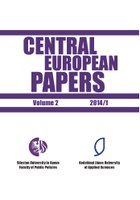Changes in the Economic Situation of the Transylvanian Catholic Community After the Trianon Treaty
Changes in the Economic Situation of the Transylvanian Catholic Community After the Trianon Treaty
Author(s): Csaba Máté SarnyaiSubject(s): History
Published by: Slezská univerzita v Opavě, Fakulta veřejných politik
Keywords: Religious freedom; ethnic minorities; concordats and minorities
Summary/Abstract: Romania’s estate politics after the Trianon treaty caused about 24,207,138 lei deficit in the school and religious funds managed by the Transylvanian Catholic Status. It is understandable that such a dramatic loss of income had serious consequences. Education was the most affected field, just as intended by the creators of the edict. The number of denominational schools decreased due to source redistributions and other obstructive decisions, and even the maintenance of the remainder was possible only through the selflessness of the followers. But it must be noted, as our analysis shows, that an exact explanation for such a situation, according to present expectations, cannot be given today. The difference between clerical and liberal views is rooted in the essential difference between the feudal and modern civil concepts of property. The primary goal of those who worked much on the elimination and abolishment of the Status was to acquire the money of these funds. For this purpose, they attempted to confuse the legal interpretation of the time when the Status and the funds were created with the interpretation of their own time. Such a confusion attempt is actually “an abuse of scholarship”, its “violation” and an opportunity for false explanations.
Journal: Central European Papers
- Issue Year: 2/2014
- Issue No: 1
- Page Range: 39-52
- Page Count: 14
- Language: English

